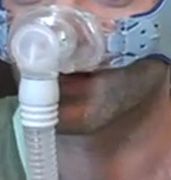
FRIDAY, June 7 (HealthDay News) — Sticking with a regular bedtime helps people with sleep apnea stay with their continuous positive airway pressure (CPAP) therapy, according to a new study.
CPAP — which uses mild air pressure to keep airways open during sleep — is the first line of treatment for sleep apnea but is not effective unless patients use it consistently, the Penn State researchers noted.
Their study looked at CPAP adherence among 97 adult sleep apnea patients. Adherence was defined as using CPAP for at least four hours per night. Patients whose bedtime was consistent within 45 minutes every night were much more likely to use CPAP for at least four hours a night than those whose bedtimes varied by 65 minutes or more.
For every 30-minute increase in bedtime variability, there was a 1.8-times greater chance that patients would not adhere to their CPAP therapy, according to the study presented Wednesday at the annual meeting of the Associated Professional Sleep Societies, in Baltimore.
After one month of treatment, patients whose bedtime varied by 75 minutes or more per night were 3.2 times more likely to use CPAP less than four hours per night, the researchers found.
Because this study was presented at a medical meeting, the data and conclusions should be viewed as preliminary until published in a peer-reviewed journal.
“Unlike many other treatments, CPAP treatment adds new complexity to a person’s daily routines,” study co-author Amy Sawyer, an assistant professor of nursing, said in a Penn State news release. She added that CPAP is a learned behavior that needs to become a habit.
The next steps include determining ways to help sleep apnea patients incorporate CPAP into their regular routine and to identify other factors that might affect patients’ adherence to CPAP therapy, Sawyer said.
More information
The U.S. National Heart, Lung, and Blood Institute has more about continuous positive airway pressure therapy.

